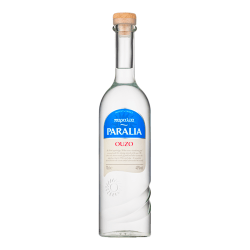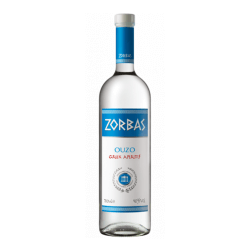Ouzo - The sweet Hellene with the star anise flavour
Ouzo is unique in the world. This is not only true for its sweet, Mediterranean taste, which immediately conjures up islands on a deep blue sea level that are white-burnt by the sun. It also applies to its production process. Because unlike many other spirits, ouzo is distilled several times. And develops its incomparable aroma only to a limited extent in the actual distillation process. It develops its incomparable aroma only to a limited extent in the actual distillation process, but above all when herbs are marinated in alcohol made from marc. Read more about this legendary liquors, about its origin and about the passion with which even the direct neighbours of the Greeks - the Bulgarians - pay homage to what is probably the most refreshing aperitif in the Balkans.
Ouzo, as its Greek inventors want it, should be enjoyed as free as possible from all worries and hardships. In this context, it is of course a good thing that ouzo itself is particularly suited to bring about precisely this state of relaxation. Because, as everyone from Athens to Thessaloniki and the islands scattered throughout the Aegean and Ionian Seas knows, ouzo is not a liquor. Ouzo is a way of life. It develops its effects in different ways. Ouzo caresses the senses, clears the mind and has a beneficial effect on digestion and general well-being.
This is mainly due to the two main spices that give ouzo its characteristic aroma: fennel and aniseed seeds. Nevertheless, both are not important for the production process at the very beginning. Rather, ouzo begins with a marc, a spirit made from the remains of grapes.
Ouzo production - How a good ouzo is made
The production of an ouzo can be divided into five different steps:
distillation of the marc and extraction of pure alcohol
Pickling the herbs in the alcohol obtained
Redistillation in at least two runs
Dilute the distillate with water until drinkable
Storage for different lengths of time depending on the desired product quality
In the first step, the decisive factor is the separation of tasteless alcohol that does not contain any aromas. In the second step, the selection and drying of the spices used plays a major role. Aniseed and fennel seeds should be of the highest possible quality and are dried in different ways, always with the aim of developing a maximum of flavour. Many ouzo distilleries also swear exclusively by star anise, a subspecies of anise that has a particularly fine aroma. In addition, each of the distilleries located throughout Greece and especially on the island of Lesbos has its own unique, top secret recipe for the exact composition of the herbs and ingredients used, which include rosemary, coriander and mastic.
There are also a lot of subtleties to be taken into account when redistilling. Above all, the throughput speed during distillation is important. Here the rule of thumb is: the slower the distillation, the higher the quality of the product. A single distillation process can therefore take many hours. And, as already mentioned, it must be repeated at least once to produce an ouzo of acceptable quality. However, this is not enough for demanding producers, their programme includes further distillation processes.
In order to be allowed to call itself ouzo at all, the distillate, which contains almost 100% alcohol, must be diluted with demineralised water in the next step after distillation to such an extent that an alcohol content of at least 38% by volume remains. The end product is either bottled immediately or matures for years before it is bottled and sent to the end consumer.
Ouzo drinking culture - Why an ouzo is not always "shot"
If you ask around in Germany in what way ouzo is drunk, the answer is usually as an appetizer before or as a digestive after a meal. This is not wrong at all. Nevertheless, the German way of drinking ouzo is a reason for alienation for many Greeks. Of course, in Greece, ouzo is also served with food. In this case, however, mostly similar to how the French drink their Pastis: diluted with ice water. And not at all before, but rather during the meal. The Greeks also like to drink good ouzo straight, for example in the late afternoon or early evening. But then from somewhat larger glasses than a German schnapps glass and in rather small sips. Finally, the Greeks know: The nose drinks with the ouzo, the star anise tickles it gently. Also a Greek way of enjoying ouzo: as a shot in the country's typical mocha.
By the way, mixing ouzo with water reveals one of its physical characteristics. For as long as ouzo has an alcohol content of over 37.5 percent by volume, it is clear. However, if this alcohol content falls below 37.5 percent by volume due to the addition of water, the liquid becomes milky. This phenomenon is called the Louche-effect and is due to the fact that the ouzo contains essential oils washed out of the anis seeds, which dissolve in alcohol but not in water. When these oils meet the overflowing water, an oil-in-water emulsion is formed immediately, and the oil molecules are enveloped by water molecules. In the border area between water and oil, the light is refracted, which results in a turbidity of the liquid.
Exactly the same happens when you put ouzo in the freezer. This is because at extremely low temperatures, the ability of alcohol to dissolve substances is greatly reduced. However, even though it is unfortunately all too often the case in German customs, you should not put ouzo in such permanently frosty situations, as it loses much of its delicious aroma.
The Bulgarians and Ouzo - A Neighbourhood History
For Bulgarians, even if they would never admit it so openly, ouzo has a very special place in their hearts. They are passionate about it. But they do not praise it loudly. Because secretly they sense in it a neighbourly rival of their own national anise-like schnapps, Mastika. Of course, they know that mastika and ouzo are not really comparable, because the way they are made is different. Conversely, the Greeks have a great attitude towards mastika, as if it could not even remotely compete with ouzo. But they are also not averse to it behind closed doors.
There is even an old story about this from the Bulgarian-Greek border area north of Lake Kerkini. Once upon a time, a Greek and a Bulgarian shepherds are said to have herded their flocks together on a particularly idyllic meadow on a mountain slope. They both carried a bottle in their food bag, which they cooled during the day in the little stream rushing by, and when the sun was finally low in the afternoon, they offered each other to drink from it. In the Greek's bottle was, you probably guessed it, ouzo, in the Bulgarian's Mastika.
After drinking to each other for a while, they got into an argument about which of the two drinks was more excellent, mastika or ouzo. They got into a loud bickering, which attracted a Bulgarian village policeman roaming the meadows, who severely questioned them. Intimidated, the brawlers asked him for his verdict on their disagreement. The answer of the policeman was: "You don't deserve this or that!" He confiscated the bottles and emptied them both after work together with his counterpart from the Greek side of the border, with whom he laughed heartily at the simple-minded shepherds.
Whatever the truth of the matter, it is clear that ouzo is very popular in Bulgaria. And that the younger generation of Bulgarians in particular like to drink it as a sophisticated drink mixed with ice-cold water or sip it straight on the rocks. Of course the Bulgarians don't just know how to enjoy ouzo. Because of their direct proximity to the Greeks, they also know which secret tips to follow in order to obtain truly exquisite ouzos.
Peshtera Paralia Ouzo - The magic of the Aegean sea
So it comes as no surprise to anyone who knows the company's extensive expertise in the field of alcoholic beverages that Vinprom Peshtera has succeeded in making the large community of quiet ouzo connoisseurs in Bulgaria almost rejoice with the introduction of Paralia Ouzo to the Bulgarian market, despite its tendency to discreet silence. This liquor, made with pure star anise by a family business on Lesvos - in the eyes of most Greeks the cradle and home of ouzo par excellence - is produced according to a secret recipe handed down for several generations. And before being bottled exclusively for Peshtera, it is stored for several weeks to complete its aroma. The result: a very elegantly pronounced star anise aroma meets a particularly silky quality. To dilute it with water? Almost a sin.
Karnobat Zorbas Ouzo - A myth in itself
It is not without reason that this ouzo is named after the character Alexis Zorbas, who was conceived by Nikos Kazantzakis and who has become a kind of hero of the modern Hellenic way of life, thanks in part to Anthony Quinn's internationally acclaimed cinematic embodiment of this character. For this liquor is just as profoundly and yet touchingly simple as its patron saint. Its sweetness, its fine star anise aroma, the way it appeals to all the senses, is a true feast for every ouzo connoisseur. No wonder the product scouts at Vinprom Karnobat don't really want to reveal where exactly in Greece they get this noble droplet, obviously produced in a very traditional way. But there are a few ouzo aficionados in Sofia, Varna and Plovdiv who are just obsessed with this information.
Ouzo with Bulgarian seal of approval - A concept with a future
The fan community of star anise containing beverages, of Greek origin, in Germany can therefore rely on Bulgarian tastebuds and palates when it comes to ouzo. Especially as there is a distinct possibility that in the long term more ouzos will succeed in establishing themselves in the high-level segment of the spoiled but always thirsty Bulgarian market. Of course we at Bulgaria-Shop.de will not withhold this information from you. It is therefore worthwhile to return here regularly. Not only to order new Ouzo. But also to see what there is to discover.
And don't forget: Ouzo should always be drunk without reliving all the worries and hardships of everyday life. In this sense: Jamas! Pour yourself a glass of ouzo. You'll see: on the wings of the turquoise blue Aegean winds that live in ouzo, worries and hardships become much lighter anyway.


